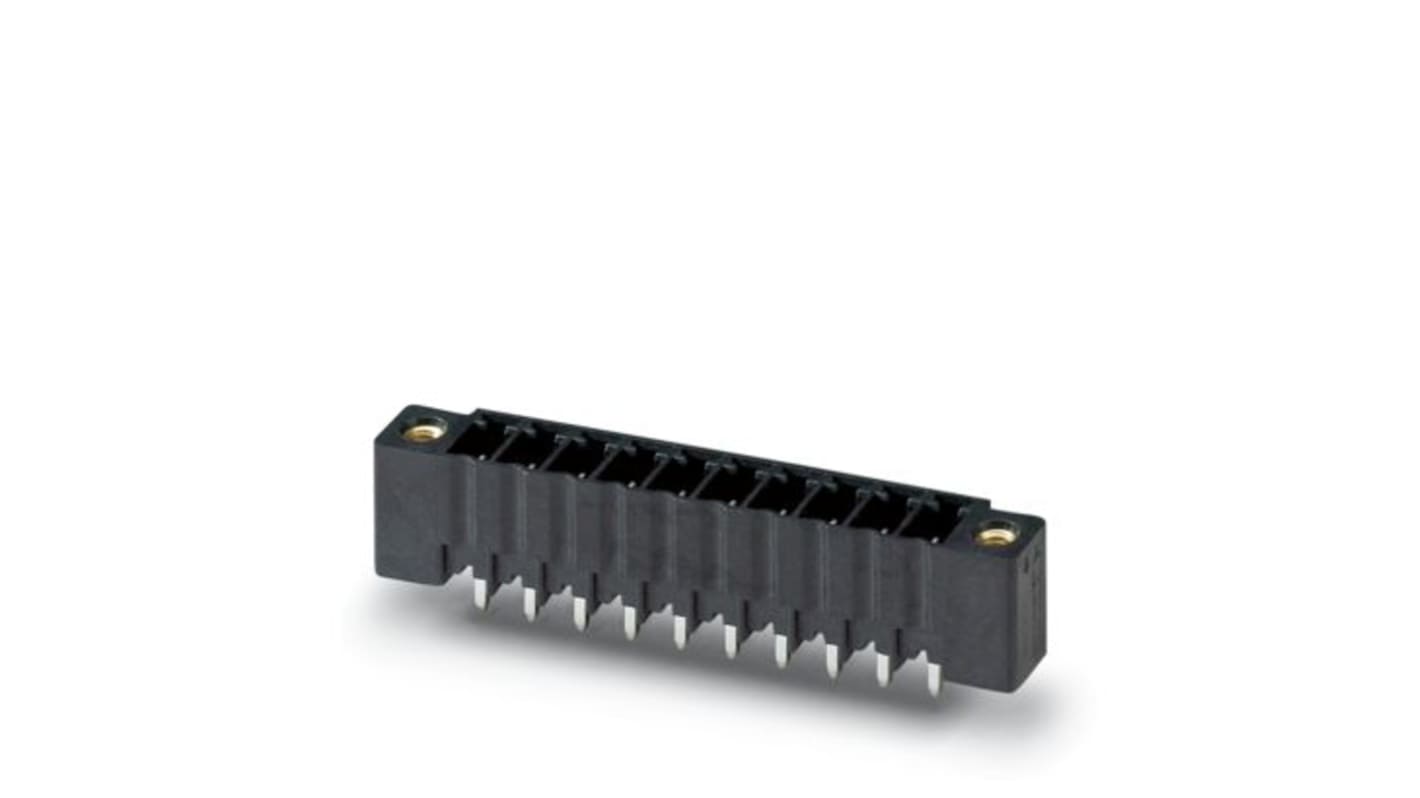Phoenix Contact MCV Series Wave Soldering Mount PCB Header, 15 Contact(s), 3.5 mm Pitch, 1 Row, Shrouded
- RS Stock No.:
- 520-803
- Mfr. Part No.:
- 1713393
- Brand:
- Phoenix Contact

Subtotal (1 pack of 50 units)*
£242.39
(exc. VAT)
£290.87
(inc. VAT)
FREE delivery for orders over £50.00
- Shipping from 01 May 2026
Pack(s) | Per Pack | Per unit* |
|---|---|---|
| 1 + | £242.39 | £4.848 |
*price indicative
- RS Stock No.:
- 520-803
- Mfr. Part No.:
- 1713393
- Brand:
- Phoenix Contact
Select all | Attribute | Value |
|---|---|---|
| Brand | Phoenix Contact | |
| Series | MCV | |
| Product Type | PCB Header | |
| Current | 8A | |
| Pitch | 3.5mm | |
| Number of Contacts | 15 | |
| Housing Material | Liquid Crystal Polymer | |
| Number of Rows | 1 | |
| Shrouded/Unshrouded | Shrouded | |
| Connector System | COMBICON MC 1.5 | |
| Mount Type | Wave Soldering Mount | |
| Contact Material | Copper Alloy | |
| Contact Plating | Nickel, Tin | |
| Termination Type | Solder | |
| Row Pitch | 3.5mm | |
| Minimum Operating Temperature | -40°C | |
| Tail Pin Length | 2mm | |
| Maximum Operating Temperature | 100°C | |
| Contact Gender | Male | |
| Standards/Approvals | CSA 13631, cULus E60425-20110128, IEC 60068-2-27:2008-02, IEC 60068-2-6:2007-12, IEC 60068-2-70:1995-12, IEC 60512-1-1:2002-02, IEC 60512-1-2:2002-02, IEC 60512-13-5:2006-02, IEC 60512-15-1:2008-05, IEC 60512-3-1:2002-02, IEC 60512-5-1:2002-02, IEC 60664-1:2007-04, ISO 6988:1985-02, UL 94 V0, VDE 40011723 | |
| Mating Pin Length | 2mm | |
| Voltage | 160 V | |
| Select all | ||
|---|---|---|
Brand Phoenix Contact | ||
Series MCV | ||
Product Type PCB Header | ||
Current 8A | ||
Pitch 3.5mm | ||
Number of Contacts 15 | ||
Housing Material Liquid Crystal Polymer | ||
Number of Rows 1 | ||
Shrouded/Unshrouded Shrouded | ||
Connector System COMBICON MC 1.5 | ||
Mount Type Wave Soldering Mount | ||
Contact Material Copper Alloy | ||
Contact Plating Nickel, Tin | ||
Termination Type Solder | ||
Row Pitch 3.5mm | ||
Minimum Operating Temperature -40°C | ||
Tail Pin Length 2mm | ||
Maximum Operating Temperature 100°C | ||
Contact Gender Male | ||
Standards/Approvals CSA 13631, cULus E60425-20110128, IEC 60068-2-27:2008-02, IEC 60068-2-6:2007-12, IEC 60068-2-70:1995-12, IEC 60512-1-1:2002-02, IEC 60512-1-2:2002-02, IEC 60512-13-5:2006-02, IEC 60512-15-1:2008-05, IEC 60512-3-1:2002-02, IEC 60512-5-1:2002-02, IEC 60664-1:2007-04, ISO 6988:1985-02, UL 94 V0, VDE 40011723 | ||
Mating Pin Length 2mm | ||
Voltage 160 V | ||
- COO (Country of Origin):
- DE
Related links
- Phoenix Contact MCV Series Wave Soldering Mount PCB Header 3.5 mm Pitch Shrouded
- Phoenix Contact MCV Series Wave Soldering Mount PCB Header 3.5 mm Pitch Shrouded
- Phoenix Contact MCV Series Wave Soldering Mount PCB Header 3.5 mm Pitch Shrouded
- Phoenix Contact MCV Series Wave Soldering Mount PCB Header 3.5 mm Pitch Shrouded
- Phoenix Contact MCV Series Wave Soldering Mount PCB Header 3.5 mm Pitch Shrouded
- Phoenix Contact MC Series Wave Soldering Mount PCB Header 3.5 mm Pitch Shrouded
- Phoenix Contact MCV Series Straight Wave Soldering Mount PCB Header 3.81 mm Pitch Shrouded
- Phoenix Contact MCV Series Vertical Wave Soldering Mount PCB Header 3.5 mm Pitch Shrouded
